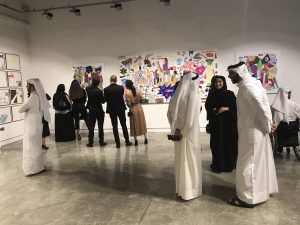Buchholz has published in different areas sociology and cultural theory, including the sociology of intellectuals and knowledge, inequality in intellectual and cultural fields, the international circulation of ideas, the sociology of embodiment, Harrison C. White’s network theory, (global) field theory, world polity theory and the diffusion of Human Rights, or culture and sustainability. Currently, most of her research centers on the globalization of culture and art markets, cultural consumption and inequality, and global/transnational theorizing.
The Globalization of Culture and Art Markets
A central line of Buchholz’s substantive research engages with the globalization of cultural production and art markets. Her recent book, The Global Rules of Art (Princeton University Press, 2022), examines the emergence of a global cultural field and the diverse ways in which artists become valued worldwide. Artistic practices and media have traveled across borders for centuries, but the book argues that something wholly new has emerged in the new millennium—a global cultural field that, for the first time, involves an institutional configuration for sustained cross-continental cultural flows and exchanges. Given this background, the study engages with a central puzzle in interdisciplinary debates about culture and globalization: As globalization leads to extraordinary cross-border flows and the transcontinental valuation of cultural goods, will these dynamics merely extend the dominance of cultural producers from a few Western countries, or will they enable the greater recognition of creators from “non-Western” locations and thus increase cultural diversity? Previous scholars may have looked at these questions as an either/or dilemma, but the study’s unique multidimensional perspective demonstrates that globalization in the art field actually follows a divided economy. The book makes the case that different conditions shape the recognition process of “non-Western” artists and cultural diversity in globalizing subfields that are oriented around a logic of symbolic recognition and charisma (represented by the global artistic subfield—e.g., art biennials, museums, art criticism) or a logic of commercial exchange. This multidimensional framework—and the varying motivations and dynamics that characterize it—challenges any simple dichotomies between the “West” and “non-West,” or the “Global South” and the “Global North.” At the same time, the book’s approach underscores how important it is to theorize the institutional diversity in globalizing cultural realms to identify the multiple logics and processes by which they work and how change can be affected. The Global Rules of Art thereby illuminates a fundamental sociological difference: that of symbolic vs. market valuation, of “status” vs. “market position.” At its heart, the book reveals how these divisions translate into different temporalities, patterns, and consequences of globalization.
Other publications and ongoing research projects in this area engage with the global circulation of cultural genres, globally networked coordination among cultural intermediaries, or the territorial and interpretative geographies of transnational cultural flows.
Cultural Consumption and Inequality within a Global Context

Buchholz’s upcoming book project, Cultural Kaleidoscopes: Decentering Taste and Global Art Value in the Global South
(working title), broadens her exploration of valorization by shifting focus from cultural mediation to cultural consumption and inequality.
Drawing on extensive fieldwork conducted in China, Mexico, and Qatar, this book provides a comprehensive global comparative analysis of contemporary art markets and their collectors in the Global South. It critically examines the traditional West-centric perspective, offering a nuanced understanding of the diverse forces that reshape these dynamic cultural markets in an era of accelerated globalization.
The book introduces an innovative theoretical framework that explores how local, regional, and global influences interact to form distinct cultures of consumption and redefine art value. This interdisciplinary work makes significant contributions at the crossroads of cultural sociology, globalization studies, economic sociology, and interdisciplinary art market research, addressing significant gaps in current scholarship.
Global/Transnational Theorizing – Globalizing Field Theory
Based on insights from her substantive research, Buchholz’s work also engages with broader theoretical and methodological questions of global/transnational sociology, particularly regarding the advancement of global field theory as a relatively new paradigm in global studies. Buchholz’s work on globalizing field theory introduces the concept of “relative vertical autonomy” to theorize the emergence and multi-scalar structure of global fields, advances a Bourdieusian “center-periphery model,” and refines the idea of “asymmetric interdependencies” from a field-theoretical perspective. Her publications also discuss the need to rethink relationalism in field theory for global/transnational research and the utility of analogical theorizing, causal mechanisms, and real-type concepts for theorizing across borders.
Copyright © 2023 L. Buchholz